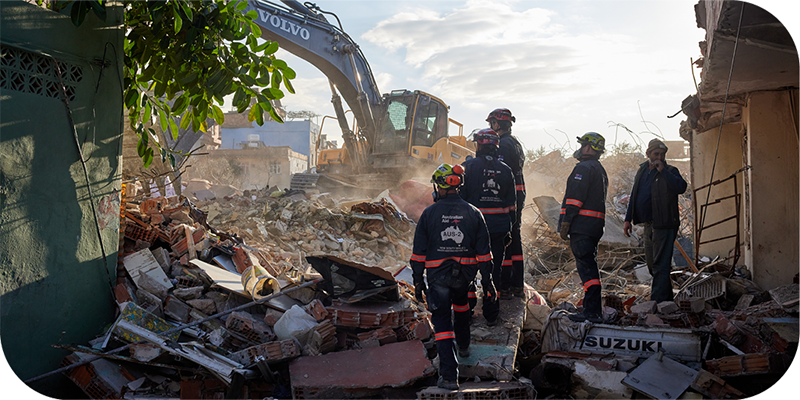
In the early hours of 6 February 2023, as the Turkish city of Gaziantep slept, a 7.8 magnitude earthquake struck. The destruction was catastrophic and rippled across the eastern part of Türkiye and the north of Syria.
That same day, a second 7.8 magnitude earthquake hit, compounding the already devastated area.
Dilara, a locally engaged Consular Services Manager based in the Australian Embassy, Ankara, with over 15 years of experience, was part of the crisis response team at the Embassy. She was already in the office working on the response to the first earthquake when the second one hit.
"Our whole building swayed, despite the earthquake occurring several hundred kilometres away," Dilara said.
"The phones were quiet. We could see on the television that the destruction was immense and widespread.
"On the third day, as the shock began to subside, we were suddenly dealing with many calls for assistance.
"Some people had lost everything and were sleeping in cars or evacuation shelters. Local authorities were overwhelmed."
The Australian Embassy, Ankara, was quickly flooded with calls from Australians and their families, desperate for help.
"It was quite chaotic as different members of the same family were calling about the same person, but the spelling of names was not the same," Dilara recalls.
Providing assistance was almost impossible, with temperatures plummeting below freezing and critical infrastructure damaged.
Dilara and two locally engaged Ankara team members received many phone calls from Australian citizens in critical situations in the affected areas. There was no electricity or running water, and the roads weren't open, delaying evacuations.
"We were receiving requests to assist Australians trapped under the wreckage," Dilara said. "Reaching local authorities was almost impossible in the first week due to the extensive devastation.
"We tried calling hospitals in the vicinity of missing Australians, but some hospitals had collapsed, and others that were still standing did not answer their phones as they were overwhelmed.
"We contacted some international search and rescue teams via the UN coordinators. We also contacted NGOs in the region to provide transportation assistance to those needing evacuation."
Through the days and weeks that followed, Dilara and the team worked tirelessly to find food, shelter or locate loved ones for stranded Australians.
Embassy staff in Ankara worked on three death cases and over one hundred welfare and other serious matters involving Australians who were either left homeless or otherwise seriously impacted by the earthquakes.
Dilara's work supporting Australians included assisting families repatriate the deceased back to Australia and working with local authorities on safe passage of orphaned children back to Australia. Local services were both disrupted and overwhelmed so important arrangements such as appointing funeral directors and obtaining death certificates from local authorities became extremely challenging.
The Embassy team played a critical role in supporting Australian families by assisting with these efforts in some cases for months afterwards.
"We worked long hours, dealt directly with earthquake victims in terrible conditions and followed the news on TV and social media," Dilara said.
"Some photos and footage were graphic. It was emotionally and physically devastating.
"I also had personal connection with the two provinces in the region and was worried about people I knew there.
"Concentrating on the work while watching the tragedies in your own country was tough."
With every day bringing new challenges, Dilara was relieved to have the support of her consular colleagues from around the region.
"It was enormously helpful having trained consular officers reaching out, following up, and chasing cases," Dilara said.
"My colleagues drafted updates and helped with translation where needed, and they were able to relieve our team so that we could get some rest.
"I have managed hundreds of consular cases and played active roles in times of crisis; however, February 2023 was the most difficult time I have ever had."

Image credit: DFAT/Nathan Fulton
DFAT crisis hub
For more on the Australian Government's response to the earthquakes in Türkiye and Syria, visit www.dfat.gov.au/crisis-hub/earthquakes-turkiye-and-syria
Australians in need of emergency consular assistance should contact the Australian Government's 24-hour Consular Emergency Centre on 1300 555 135 (within Australia) and +61 2 6261 3305 (from overseas).
